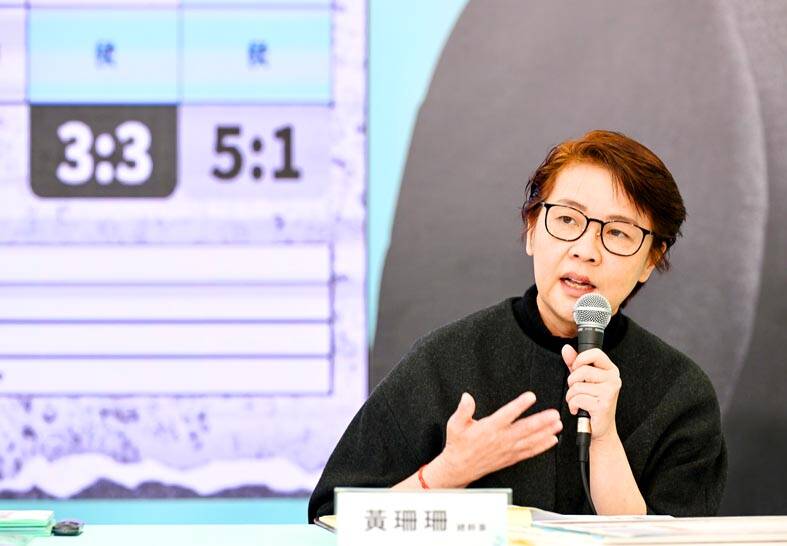The Taiwan People’s Party (TPP) on Wednesday released its legislator-at-large nominees for the Jan. 13 elections, with former Taipei deputy mayor Vivian Huang (黃珊珊) topping the 34-person list for the elections on Jan. 13.
Under Taiwan’s electoral system, the number of legislator-at-large seats is prorated according to the number of party votes each party receives, with a threshold of 5 percent of all party votes cast.
Each party is entitled to submit a ranked list of 34 nominees for 34 at-large seats in the 113-seat legislature, which also has 73 seats elected from single-member legislative constituencies and six seats for indigenous candidates.

Photo: Lo Pei-de, Taipei Times
TPP Chairman and presidential nominee Ko Wen-je (柯文哲) told a news conference that Huang, who served as his deputy during his time as Taipei mayor and failed in a bid to succeed him last year, is an efficient worker.
Ko also praised the TPP’s No. 2 pick, Huang Kuo-chang (黃國昌), a former New Power Party (NPP) legislator, for his work uncovering corruption while serving as a lawmaker.
Huang Kuo-chang last week resigned from the NPP, which he cofounded in 2015 and chaired from its inception to March 2019.
The party emerged from the 2014 Sunflower movement, a student-led protest against a cross-strait service trade agreement being negotiated under the then-Chinese Nationalist Party (KMT) government and China.
Surrogacy advocate Chen Chao-tzu (陳昭姿) was third on the TPP’s list.
Asked about reports that Hon Hai Precision Industry Co founder Terry Gou (郭台銘), an independent presidential aspirant, was offered the top position on the list, as Ko has been attempting to unify opposition forces behind a joint presidential ticket, Ko said Gou declined the offer.
There had been reports that China-born Xu Chunying (徐春鶯), who gained Republic of China citizenship in 2000, would be on the list, but she declined the nomination.
Li Zhenxiu (李貞秀), another Chinese married to a Taiwanese, was 15th on the list.

Taiwan is to commence mass production of the Tien Kung (天弓, “Sky Bow”) III, IV and V missiles by the second quarter of this year if the legislature approves the government’s NT$1.25 trillion (US$39.78 billion) special defense budget, an official said yesterday. Commenting on condition of anonymity, a defense official with knowledge of the matter said that the advanced systems are expected to provide crucial capabilities against ballistic and cruise missiles for the proposed “T-Dome,” an advanced, multi-layered air defense network. The Tien Kung III is an air defense missile with a maximum interception altitude of 35km. The Tien Kung IV and V

The disruption of 941 flights in and out of Taiwan due to China’s large-scale military exercises was no accident, but rather the result of a “quasi-blockade” used to simulate creating the air and sea routes needed for an amphibious landing, a military expert said. The disruptions occurred on Tuesday and lasted about 10 hours as China conducted live-fire drills in the Taiwan Strait. The Civil Aviation Administration (CAA) said the exercises affected 857 international flights and 84 domestic flights, affecting more than 100,000 travelers. Su Tzu-yun (蘇紫雲), a research fellow at the government-sponsored Institute for National Defense and Security Research, said the air

A strong continental cold air mass is to bring pollutants to Taiwan from tomorrow, the Ministry of Environment said today, as it issued an “orange” air quality alert for most of the country. All of Taiwan except for Hualien and Taitung counties is to be under an “orange” air quality alert tomorrow, indicating air quality that is unhealthy for sensitive groups. In China, areas from Shandong to Shanghai have been enveloped in haze since Saturday, the ministry said in a news release. Yesterday, hourly concentrations of PM2.5 in these areas ranged from 65 to 160 micrograms per cubic meter (mg/m³), and pollutants were

Taiwan lacks effective and cost-efficient armaments to intercept rockets, making the planned “T-Dome” interception system necessary, two experts said on Tuesday. The concerns were raised after China’s military fired two waves of rockets during live-fire drills around Taiwan on Tuesday, part of two-day exercises code-named “Justice Mission 2025.” The first wave involved 17 rockets launched at 9am from Pingtan in China’s Fujian Province, according to Lieutenant General Hsieh Jih-sheng (謝日升) of the Office of the Deputy Chief of the General Staff for Intelligence at the Ministry of National Defense. Those rockets landed 70 nautical miles (129.6km) northeast of Keelung without flying over Taiwan,